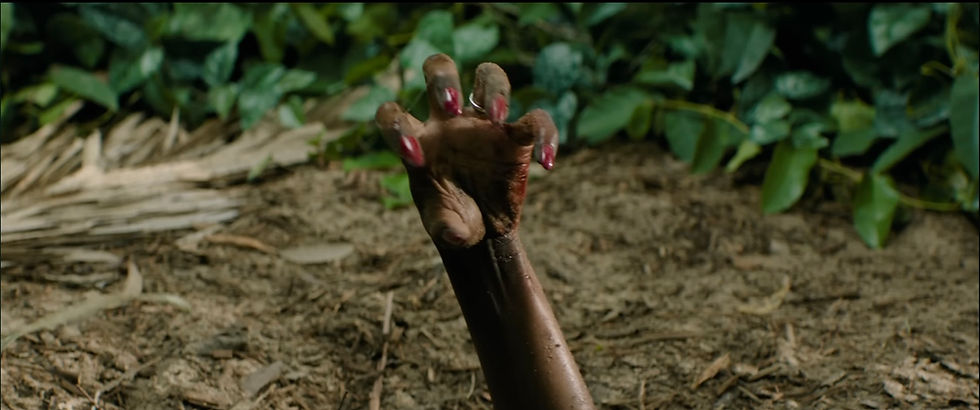'Belfast' Can't Survive on Nostalgia Alone
- Hector A. Gonzalez
- Nov 16, 2021
- 4 min read
Updated: Mar 7, 2022
There are a few key moments in Kenneth Branagh’s love letter to the city he once called home that can be applauded, but for most of its runtime, it is a charming but hollow drama with the sole dramatic intent of delivering feel-good inanities and clichés. At the end of the day, the film is not much more than a simplistic “crowd-pleaser.”

Kenneth Branagh is a man of many talents: actor (of the Shakespearean variety), director, and writer. His works don’t stick to one specific genre or topic, and that, in a way, is what makes him such an exciting filmmaker. He isn’t afraid to tackle any theme or genre and leaps headfirst into the diving pool of cinema. As a result, his projects drastically vary in quality. He has his number of complete misfires, like Mary Shelley’s Frankenstein (1994) or the remake of the classic Sleuth (2007), but he also has some gems, such as Henry V (1989), Hamlet (1996), and 2015’s rendition of Cinderella (which I am a fan and defender of).
A year after delivering his worst film to date, the disastrous Artemis Fowl, he has decided to ditch the fantasy and Shakespearean splendor of his past features in favor of a more personal project, taking form in a romp through his childhood in the Northern Ireland capital, Belfast. The film follows a nine-year-old boy, Buddy (Jude Hill), exploring his burgeoning adolescence as the Troubles, a series of nationalist riots, rock the world around him. He lives in a loving community and family (Jamie Dornan, Caitriona Balfe, Judi Dench, and Ciaran Hinds), but his perceptions of the world are frequently challenged. Despite his nation’s struggles, he copes with joy, laughter, and the magic of music and cinema.
It is said that all great pictures are, in some way, shape, or form, personal to the auteur. Branagh went with the classic autobiographical route, in the way that many great directors have done (Fellini’s Amarcord, Malle’s Au Revoir Les Enfants, or Bergman’s Fanny and Alexander). However, that concept alone doesn’t mean it is an instant critical success. Those at the helm of a semi-autobiographical film must add substance and intrigue. Sentimentality alone is not enough. In many ways, that is the problem with Branagh’s valentine to Belfast.

People have been comparing Belfast to Roma (Alfonso Cuarón), an endearing and masterfully crafted piece about life in Mexico during the early 1970s; however, I think this is quite unfair to Cuarón. Branagh doesn’t know how to control the film’s emotional beats, nor can he manage the segmented structure and pacing. When someone opens their heart or delivers a thoughtful refrain, it wanders off quickly to another scene. There are moments where he almost has it, and there seems to be an anticipatory climax, but he then switches to another scene, quickly abandoning the ideas he was proposing to explore, or at the very least express. This situation happens multiple times in the picture. There is some charm to be found in the lighter scenes, such as Dornan and Balfe’s characters dancing to Love Affair’s “Everlasting Love,” but the film, for the most part, feels hollow.
On a more positive note, the performances are pretty good. Jude Hill and Lara McDonnell resemble Roman Griffin Davis and Thomasin McKenzie in Waititi’s JoJo Rabbit (which is also being compared tonally to this film despite being the virtual opposite of Roma), and Jamie Dornan has a lot of fun with his role as Buddy’s father. The standout, however, is the fabulous Caitriona Balfe. She is the heart and soul of the film, and even when the story doesn’t work, Balfe does her best, totally captivating when she’s on-screen. She is effortlessly magnetic. The cinematography is also quite lovely; a handful of scenes are arresting, like the dancing sequences between Dornan and Balfe, the riot scene, and a couple of quick-second maneuvers. Nonetheless, there is an argument against it being in black and white. This year, multiple films use black and white cinematography without any purpose; Belfast is one of them, even if it looks good.
There is little to no need for Branagh’s cine-memoir to be in black and white, much more when it has a couple of scenes in color. Rebecca Hall’s directorial debut, Passing, is an example of great use of that type of cinematography since it reflects perfectly on its themes. Branagh wanted to be stylistically ambitious, but it comes off as frivolous. It sometimes uses handheld camerawork, but then it switches to static for no apparent reason. Several scenes are shot very differently from the previous one that passed, leaving the audience questioning as to whether or not it is purposefully made like that or not. It also tries to reference several westerns like High Noon and The Man Who Shot Liberty Valance, yet it shares very little with the western genre, both formally and thematically.

What does Belfast have to say? Not much. Other than having some heartwarming scenes to distract from the agonies of modern living for a quick second, its story is saccharine. It doesn’t expand on many of its ideas or narrative plotlines; everything comes at face value. I know what Branagh wanted to do here, but it is a film I appreciate more than I like. I just wish he would have thought the story arc through. A broader and more thoughtful expansion on some of its themes (coming of age during tumultuous times, the Troubles, or the usual “it was the best of times, it was the worst of times” scenario) would have made this a far more substantial and engaging picture.
-Hèctor



Comments